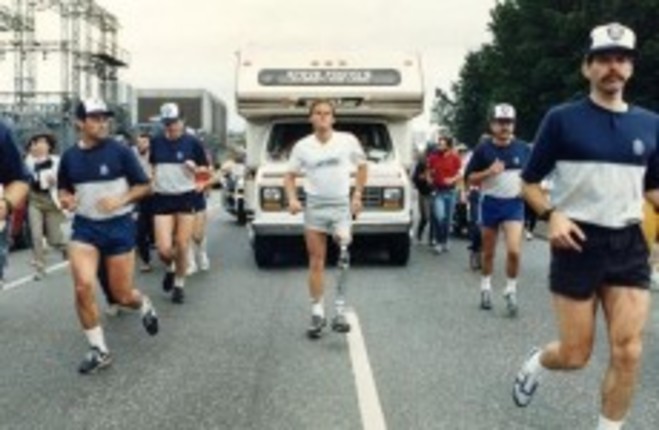THE STORY OF Steve Fonyo is one which is not very well-known outside of the North American continent.
Yet, it is a gripping tale, illuminating by the insights it presents into both the strength and the frailty of the human spirit.
Having lost his left leg to cancer at the age of 12, Fonyo, a Montreal native, decided that it was time for him to make a powerful statement on behalf of cancer patients around the world, raising some much needed funds in the process.
Fonyo aimed big, deciding that no normal athletic feat would be sufficient if he was to raise awareness to the levels he desired. And so, at just 18 years of age, he conceived the “Journey for Lives,” a 7,924 kilometre (4,924 miles) cross-Canada marathon.
The inspiration for Fonyo’s plan was Terry Fox, another Canadian cancer patient who had to abandon his similar attempt a few years earlier when his cancer returned. With the obvious parallels between the two attempts, the teenager came in for criticism, derided by some as an unscrupulous self-publicist seeking to capitalize on Fox’s legacy.
Fonyo shrugged off the attempts to halt his project, commencing his 31 March 1984. With a Herculean effort and single-minded determination, he managed completed the marathon over the 14 months which followed, winning over the nation and raising a staggering CDN$14m. Later that year, he was made an officer of the Order of Canada, a recognition that would have been unthinkable just a a year previously.
If Fonyo’s initial achievement was testament to the creed that nothing in life is impossible, the tale of his post-Journey life hints at a painfully human frailty.
Even as he was completing his cross-country pursuit, Fonyo was struggling. His father, Steve Sr., was battling a cancer of his own, one which would eventually claim his life shortly after he completed his marathon.
The glare of media attention, combined with his suffering from depression and his subsequent struggles with alcohol and cocaine addiction, led the one-time hero down a path on which his legacy lost its sheen.
In December 2009, following numerous police convictions, the governor of British Colombia took the decision to revoke the Order of Canada, a symbolic statement of Fonyo’s decline in the eye of the public.
Often described in terms of a Shakespearean tragic hero rather than as a villain, there are those who have argued that the $14m and the awareness which Fonyo raised outstrips all of the black spots which mar the story of his life.
Yet, at the root of it all, Fonyo’s is a very human story.
This week in sports history
- An estimated 300 spectators are killed in a stadium disaster in Lima, Peru (24 May 1964).
- The AFL grants a franchise to the Cincinnati Bengals (24 May 1967).
- Muhammad Ali KOs Sonny Liston in the first minute of the first round of their heavyweight bout (25 May 1965).
- Aston Villa win the UEFA European Cup (26 May 1982).

